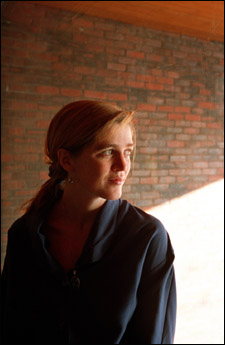Speaking truth with Power:
KSG lecturer wins award for genocide book

Samantha Power has been a bit overwhelmed by the attention she has been getting lately. A typical day for her includes one or more speaking engagements, an interview or two, and an inbox crammed with hundreds of e-mail messages. And all this on top of her teaching and research commitments.
“I’m finding that my eyes are bigger than my capacity,” she says. “I could learn a few lessons on how to say ‘no.’”
She rarely does say no, however. After all, she is a woman with a message, and the media attention provides a way of getting that message out. So saying no seems counterproductive. Sensible, perhaps, but counterproductive.
Power’s recent notoriety comes as result of her book, “A Problem from Hell: America and the Age of Genocide” (Basic Books, 2002), which was recently named as the winner of the National Book Critics Circle prize in nonfiction.
The title is from a remark made in 1995 by former Secretary of State Warren Christopher about ethnic hostilities in the former Yugoslavia. Made in response to the Serb nationalists’ shelling of Sarajevo, the remark was meant to express a sense of futility about ameliorating ethnic hatreds of such violence and duration.
Power, now a lecturer at the Kennedy School of Government and an affiliate of the Carr Center for Human Rights Policy, which she founded in 1999, has firsthand knowledge of the conflict in Yugoslavia, having gone there in 1993 as a freelance journalist. It was her first reporting job. She had gone on her own with only the promise from an editor at U.S. News and World Report that he would accept her collect calls from the field.
As a 22-year-old recent college graduate, Power felt this was the only way she could make a contribution toward raising awareness of the ethnic cleansing policy of the Bosnian Serbs and its toll in human death and suffering. The gamble worked. U.S. News and World Report eventually took one of her articles, and on the strength of that success she became a full-time correspondent for the Boston Globe and other publications.
Returning to the United States after the war, Power decided that a law degree would give her the skills to help prosecute war criminals. She enrolled in Harvard Law School. But what she saw around her created a sense of dissonance between the values that were being affirmed and the nation’s current policies.
It was a time when the Holocaust was very much in the public eye. The Holocaust Museum had opened in Washington, Stephen Spielberg’s movie “Schindler’s List” was receiving respectful attention, and humanitarians were vowing that “never again” would the world stand by while genocide was being perpetrated.
And yet at the very same time, Muslims in Sarajevo and elsewhere were being murdered, raped, and driven from their homes while the Clinton administration argued that intervention would not serve American interests.
The situation prompted Power to delve into American history to see whether such inaction had always been the norm. She discovered that it had. From 1915, when Turkey began its attempted extermination of the Armenians, to genocidal campaigns in Germany, Cambodia, Iraq, Bosnia, and Rwanda, the United States had done very little to stop the slaughter. Power wondered why.
“The question I was trying to answer was: Why does America do so little about genocide? And that raises a second question: Why do we think we’re so much better than we are? What are the stories we’re telling ourselves that allow us to view ourselves as innocent?”
Power’s 600-page book is her attempt to answer these questions. She finds that again and again authorities failed to act, downplaying the severity of the atrocities or pleading ignorance after it was too late. And yet within these dismal sagas, Power finds cause for hope.
In addition to documenting the moral failures of those in authority, the book celebrates the efforts of individuals who persisted in speaking out against genocide. These lone moral actors are the heroes of the story: Henry Morgenthau, U.S. ambassador to the Ottoman empire, who urged the Wilson administration to do something to help the Armenians; Raphael Lemkin, who coined the word genocide and fought to have it declared a crime by the United Nations; Sen. William Proxmire, who made 3,211 speeches on the Senate floor urging the United States to ratify the U.N.’s anti-genocide convention; Peter Galbraith, a member of the Senate Foreign Relations Committee staff, who called for the United States to stop aid to Saddam Hussein after the Iraqi leader used poison gas against the Kurds in 1988.
“I think the book shows the role of individuals in history and the impact they can have.”
In Power’s view, the efforts of these individuals, while producing little effect in the short term, have helped to change the world’s ethical awareness and its standards of behavior.
“I recognize that human nature being what it is, killings will always take place, but between 1915 and 1995 I think there have been significant changes. There have been two military interventions against Bosnia, we’ve established the War Crimes Tribunal and the International Criminal Court. I haven’t given up hope at all.”




